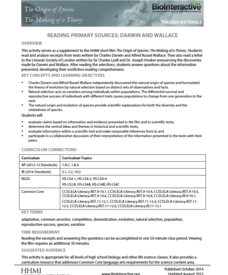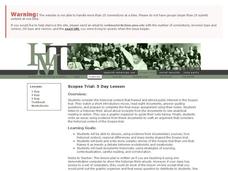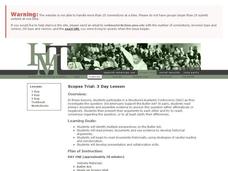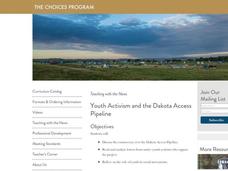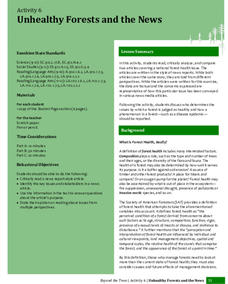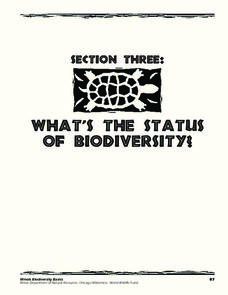Curated OER
Rhetorical Devices in a Primary Source
Analyze Martin Luther King Jr.'s famous and powerful "I Have a Dream" speech as a primary source document. After reading up on rhetorical devices and working in small groups to define terms, class members identify and explain the use of...
EngageNY
Grade 9 ELA Module 1, Unit 2, Lesson 4
As a mid-unit assessment, class members demonstrate their understanding of the concepts covered so far by crafting a formal, multi-paragraph essay in which they analyze how Rainer Maria Rilke's word choices develop the meaning and tone...
University of Chicago
Using Artifacts for Clues About Identity
Learn about the ancient Near East through a close examination of ancient artifacts. Lead your class into analysis by first observing an artifact as a class. Pupils can then work in pairs to analyze the other artifacts and compile a list...
Howard Hughes Medical Institute
Reading Primary Sources: Darwin and Wallace
Take your classes back in time. Learners read real historical texts from both Darwin and Wallace as well as an announcement of their findings. Using guiding questions, they make inferences and draw conclusions from the information in the...
Louisiana Department of Education
Hatchet
Accompany a novel study of Hatchet by Gary Paulson with a unit consisting of 16 lessons focused on physical and emotional survival. Reading the story along with a variety of informational texts, scholars compare and contrast reading...
Maryland Department of Education
The Concept of Diversity in World Literature Lesson 9: Debating Imperialism
To gain an understanding of Imperialism, class members read Rudyard Kipling's poem, "The White Man's Burden" and Mark Twain's essay, "To the Person Sitting in Darkness." Groups compare these perceptions of non-white cultures with the...
Curated OER
Magazine Production
Analyze magazines as a class, looking carefully for the target audience, advertisements, and topics presented. Small groups then work as a publication team and receive a magazine that they have to "sell." Each individual has a different...
Curated OER
Caliphates Graphic Organizer
As your young historians learn about the Umayyad and early Abbasid Caliphate through reading secondary sources, have them use this simple printable to organize their notes on the topic and provide points of focus for their reading.
Prestwick House
Understanding Language: Slant, Spin, and Bias in the News
We live in a time of fake news, alternative realities, and media bias. What could be more timely than an activity that asks class members to research how different sources report the same topic in the news?
CHPCS
The United States in the 1920s: The New Negro Movement and the Harlem Renaissance
Music, writing, and activism all tell the story of history! The resource uses these elements and more in a presentation to discuss the Jazz Age and Harlem Renaissance. Your class views biographies, discusses important events, and...
Annenberg Foundation
America's History in the Making: Classroom Applications Three
How can primary sources bring history to life? Scholars create detailed lesson plans on the late nineteenth and early twentieth centuries in American history. The 17th installment of a 22-part program exploring American history examines...
Annenberg Foundation
America's History in the Making: Classroom Applications Four
The final installment of a 22-part American history series examines the many faces that make up the country's story. From Henry Ford to Tulio Serrano, scholars use biographical evidence and Internet research to uncover the people behind...
Curated OER
Solar Kit Lesson # 12 - Calibration Curve for a Radiation Meter
Scientists need to have mastered algebraic slope-intercept concepts in order for this lesson to be effective. They will measure and graph solar panel output as a function of the amount of radiation striking it, discovering that there is...
Historical Thinking Matters
Scopes Trial: 5 Day Lesson
Did Scopes violate the Butler Act? Why did so many Americans follow the Scopes trial? See analytical reading in action with a fantastic five-day lesson plan in which class members consider the historical context that provoked public...
Historical Thinking Matters
Rosa Parks: 5 Day Lesson
What led to the success of the Montgomery Bus Boycott, and how might historians approach this question differently? This rich series of lessons includes a short introductory video clip, analysis of six primary source documents, and...
Los Angeles Unified School District
World History Medieval and Early Modern Times
A slew of graphic organizers, worksheets, and student activities are packaged here for your world history pupils. From comparing and contrasting the Qur'an and Sunnah, studying cultural diffusion across eastern nations, or examining the...
Historical Thinking Matters
Scopes Trial: 3 Day Lesson
Was the Scopes trial more complicated than a simple debate between evolutionists and creationists? As part of a structured academic controversy (SAC) activity, pupils consider multiple perspectives of the Butler Act and engage in close...
University of Virginia
Illustrating Uncle Tom's Cabin
Historical illustrations reveal more than what they are meant to portray. After reading Harriet Beecher Stowe's Uncle Tom's Cabin, high schoolers view a series of illustrations, movie posters, photographs, and book covers that exemplify...
Brown University
Youth Activism and the Dakota Access Pipeline
Do young people have a role in social movements? Should they? The involvement of young people in the Dakota Access Pipeline is the focus of a resource that asks class members to examine letters written by native youths who oppose the...
Novelinks
Zach’s Lie: The K-W-H-L Strategy
The attached resource is no lie! The K-W-H-L activity, which is fourth in a series of seven, serves as a pre- and post-assessment. First, pupils brainstorm what they know about a specific topic, then they list what they want to know, how...
University of Florida
Unhealthy Forests and the News
Everyone knows a tree makes a sound when it falls, but what do we know about dying trees? Class members learn background information about Laurel wilt disease from a teacher-led presentation. Team members work with partners to read and...
Houghton Mifflin Harcourt
Person to Person: Challenge Activities (Theme 4)
The world is a big place—discover it! A series of challenge activities designed to accompany Theme 4: Person to Person encourages learners to explore the world around them. Project-based activities promote research and writing skills in...
Illinois Department of Natural Resources
Section Three: What's the Status of Biodiversity?
Biodiversity is essential for every habitat, but many species are at risk due to pollution and other factors. Explore several different species native to Illinois in a gallery walk with posters that learners have created after research...
Newseum
E.S.C.A.P.E. Junk News
Fair, balanced, and reputable information? There's an acronym for that! Scholars learn the E.S.C.A.P.E. method for evaluating news sources. Then, pupils work in small groups to read and analyze a news story and discuss the activity to...





